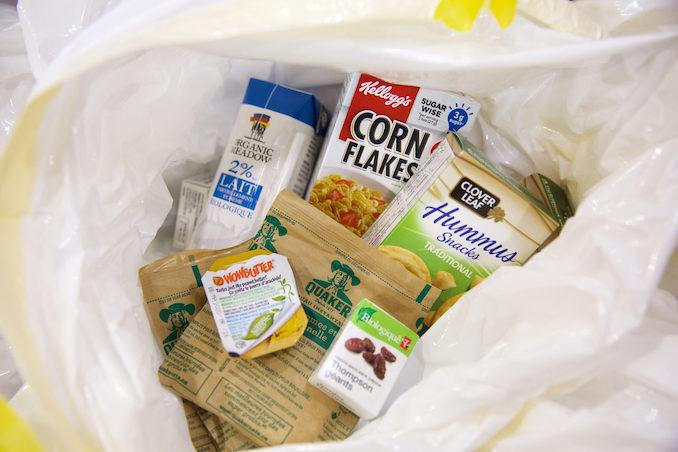With the end of the school year, summer is in full swing with swimming, canoeing and making smores by the campfire.
But what if the simple ingredients for smores – marshmallows, chocolate and graham crackers – are way out of your budget? What happens when summer actually means more nights going to bed hungry or fretting all night worrying about how you’re going to feed your children?

Over 300,000 children in Canada struggle with food insecurity and many of those children rely on in-school programs to help fill their tummies. And their parents rely on these programs to offset their food budgets so that there is more money to go to things like rent or car expenses. And just like schools go on vacation, so too do these programs, leaving the recipients of the food struggling to keep full.
To help combat this issue, Food Banks Canada has come up with After the Bell, a program that helps families stay fed during the summer months. The aim of this program is to deliver healthy food packs to communities in need so that families that rely on school food programs won’t have to go hungry.
In order to get a better view of this program and the growing problem of hunger in Canada, I spoke with Caroline Newton the Chief Communications Officer at Food Banks Canada. Newton has been an advocate for social change for numerous years and for the past year she has been working with Food Banks Canada on getting the message out that more needs to be done.
As we have all been experiencing lately, prices have been skyrocketing, in particular in the grocery store. This has had a major impact on food banks across Canada and Newton admitted that this has been the “most challenging time in [the Food Banks of Canada] 40-year history.”
Newton talked about three main issues that food banks have been facing which have directly affected their ability to help people. The biggest issue is that food banks across the country are having a difficult time keeping up with demand. There are a lot more people who need help getting food and some food banks are finding it hard to keep their shelves stocked.
This issue is only compacted by the fact that food is more expensive. Not only do food prices affect how many people are in need of help, but it also affects how much food the food banks can buy, meaning your donation dollars are not able to go as far as they used to. And that brings us to the third issue I discussed with Newton- not as many people are able to donate as everyone is trying to decrease their spending.
This means that programs such as After the Bell are needed now more than ever. By providing healthy food packs for kids who usually rely on school or community food programs, we can help the entire family get through the summer without going hungry. As Newton explained, though these packs are for children, by providing this help, you are allowing parents to stick to their usual food budgets, meaning they don’t have to sacrifice their own meals in order to feed their children. In the words of Newton, “no parent should have to choose between feeding themselves or feeding their children” and with After the Bell, hopefully, fewer parents will have to do this.
So, how can we help? The biggest thing according to Newton is to pay attention. According to a study done by Food Banks Canada, 61% of people that have housing issues say that this directly affects their food security. As rents increase, families have less money for other essentials like food. Newton advocates for fixed incomes and affordable housing and hopes that people are paying attention to how these issues directly affect the hungry.
And of course, if you want to help directly, you can always donate money, food or time. There is always a need for all three and your donation will go a long way to helping those in need.
If you would like to know more about the After the Bell program or donate to Food Banks of Canada, please see their website.




